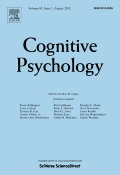
COGNITIVE PSYCHOLOGY
Scope & Guideline
Leading the Way in Cognitive Research
Introduction
Aims and Scopes
- Cognitive Mechanisms and Processes:
The journal focuses on the fundamental cognitive mechanisms that govern processes such as memory, perception, attention, and language. Studies often employ experimental methodologies to unveil the intricacies of these cognitive functions. - Developmental Psychology:
There is a strong emphasis on developmental aspects of cognition, exploring how cognitive abilities evolve from infancy through adulthood, and how various factors such as age and experience influence cognitive development. - Decision Making and Problem Solving:
Research that investigates the cognitive underpinnings of decision-making processes and problem-solving strategies is a core area. This includes studies on risk-taking, choice behavior, and cognitive biases. - Language and Communication:
The journal includes significant contributions related to language acquisition, processing, and the cognitive aspects of communication, highlighting how language influences thought and vice versa. - Social Cognition and Interpersonal Processes:
Explorations of cognitive processes in social contexts, such as how individuals perceive others, make attributions, and engage in social interactions, are also prominent. - Mathematical and Spatial Cognition:
The journal addresses cognitive processes related to mathematical reasoning and spatial awareness, often integrating theoretical models with empirical findings.
Trending and Emerging
- Interdisciplinary Approaches to Cognition:
Recent publications increasingly incorporate insights from neuroscience, computational modeling, and social sciences, reflecting a trend towards interdisciplinary research that enriches the understanding of cognitive processes. - Cognitive Development in Early Childhood:
There is a notable increase in research focusing on cognitive development during early childhood, particularly studies examining how infants and young children acquire language and reasoning skills. - Impact of Technology on Cognition:
Emerging themes include investigations into how technology, such as digital devices and online learning environments, influences cognitive processes, learning, and memory. - Complex Decision-Making Frameworks:
An increase in studies using complex models to examine decision-making processes highlights a shift towards understanding the nuanced factors that influence choices, including risk assessment and social influences. - Emotional and Social Influences on Cognition:
Research exploring the intersection of emotion, social context, and cognitive processes is gaining traction, indicating a recognition of the importance of these factors in understanding cognition.
Declining or Waning
- Traditional Memory Models:
Research focusing on classical models of memory, such as those based on strict serial processing or simple rehearsal mechanisms, has decreased. This suggests a movement towards more complex and integrative models of cognitive function. - Basic Sensory Processing Studies:
There appears to be a waning interest in studies that solely focus on basic sensory processing without connecting to broader cognitive implications. The trend seems to favor research that links sensory processing to higher-order cognitive functions. - Static Perspectives on Language Processing:
Studies that treat language processing as a static or isolated phenomenon are diminishing. There is a growing trend towards understanding language as part of dynamic cognitive interactions and contextual influences.
Similar Journals

Journal of Cognitive Science
Pioneering Research in Cognitive ProcessesThe Journal of Cognitive Science, with ISSN 1598-2327, is a distinguished publication from SEOUL NATL UNIV, INST COGNITIVE SCIENCE, focusing on the multidisciplinary field of cognitive science. Established in 2016, this journal aims to advance knowledge in various domains, including Artificial Intelligence, Cognitive Neuroscience, and Experimental Psychology, while also delving into Linguistics and Language. Although currently categorized in Q4 for several subjects in the 2023 rankings, it presents an invaluable platform for innovative research and scholarly discourse, providing insights that connect cognitive processes with practical applications, thus fostering cross-disciplinary collaboration. Located in South Korea, the journal adheres to rigorous academic standards, inviting submissions that contribute significantly to understanding cognition in a digital age. While it does not offer Open Access, readers can access articles through university libraries and academic databases, engaging with the latest findings and theories that shape the future of cognitive science.
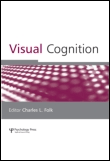
VISUAL COGNITION
Shaping the Future of Visual Cognition StudiesVISUAL COGNITION, published by Routledge Journals, Taylor & Francis Ltd, is a leading academic journal dedicated to the nuanced understanding of visual processing and cognition. Since its inception in 1994, the journal has become a pivotal resource for researchers and practitioners in fields including Cognitive Neuroscience and Psychology, having achieved a distinguished Q1 ranking in Arts and Humanities and impressive standings among its peers in experimental and cognitive psychology. With an impact factor reflecting its scholarly significance, VISUAL COGNITION serves as a forum for high-quality research articles that shed light on the cognitive aspects of visual perception. Although it operates under a subscription model, the journal remains committed to disseminating knowledge that inspires both established and emerging scholars alike. For those interested in the latest advancements in visual cognition, this journal promises a wealth of insights and rigorous scholarly dialogue.

JOURNAL OF PSYCHOLINGUISTIC RESEARCH
Bridging Disciplines to Illuminate Language UnderstandingJOURNAL OF PSYCHOLINGUISTIC RESEARCH is a premier scholarly publication dedicated to the interdisciplinary exploration of language and cognition. Established in 1971 and published by Springer/Plenum Publishers, this journal serves as a vital platform for researchers in Experimental and Cognitive Psychology, Linguistics, and related fields. With an impressive reputation reflected in its 2023 Category Quartiles—Q3 in Experimental and Cognitive Psychology, Q1 in Linguistics and Language, and Q2 in Psychology (miscellaneous)—the journal ranks prominently within the Scopus database, reaching the 88th percentile in Language and Linguistics. Researchers and professionals have the opportunity to disseminate their findings effectively, enriching contemporary understanding of psycholinguistic phenomena through rigorous peer-reviewed articles. Although currently not an open-access journal, it provides extensive access options that cater to a global audience, ensuring that the latest research is readily available to those dedicated to advancing this dynamic field. We invite scholars, practitioners, and students to engage with this essential resource for fresh insights and innovative research methodologies.
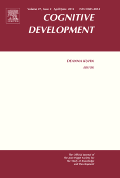
COGNITIVE DEVELOPMENT
Exploring the Depths of Cognitive GrowthCognitive Development is a prestigious academic journal published by Elsevier Science Inc, focusing on the critical area of developmental and cognitive psychology. With an ISSN of 0885-2014 and an E-ISSN of 1879-226X, this journal serves as a vital platform for the dissemination of innovative research, theories, and methodologies from 1986 to the present, with the latest articles contributing to a comprehensive understanding of cognitive processes in children and adolescents. Positioned in the second quartile (Q2) of both the Developmental and Educational Psychology and Experimental and Cognitive Psychology categories, Cognitive Development holds an essential place in shaping contemporary psychological research, boasting robust Scopus rankings of #175/360 and #90/165 in its respective fields. Though not an open-access journal, it provides valuable insights and rigorous studies essential for researchers, professionals, and students engaged in the intricate processes of cognitive development. Whether you're looking to publish significant findings or simply stay updated on the latest advancements, Cognitive Development is an indispensable resource in the psychological community.
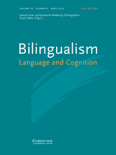
Bilingualism-Language and Cognition
Advancing Insights into Bilingualism and CognitionBilingualism-Language and Cognition, published by Cambridge University Press, is a leading journal in the fields of Education and Linguistics, renowned for its rigorous academic contributions and influential research. With an impressive impact factor placing it in the Q1 quartile of both fields, this journal ranks among the top-tier publications globally, reflecting its commitment to advancing the understanding of bilingualism and its cognitive implications. Since its inception in 2005, Bilingualism-Language and Cognition has garnered significant attention, evidenced by its remarkable Scopus rankings—11th in Language and Linguistics and 12th in Social Sciences. Dedicated to publishing high-quality original research, reviews, and integrative studies, the journal aims to foster interdisciplinary dialogue among researchers, educators, and practitioners. Although not currently an open access journal, it remains a vital resource for those engaged in bilingualism research and its cognitive dimensions, contributing to the academic landscape from its home in Cambridge, United Kingdom.

PSYCHONOMIC BULLETIN & REVIEW
Transforming Ideas into Impactful Psychological Knowledge.PSYCHONOMIC BULLETIN & REVIEW is a premier journal published by SPRINGER, dedicated to advancing the fields of psychology, particularly within the domains of Arts and Humanities, Developmental and Educational Psychology, and Experimental and Cognitive Psychology. With its ISSN 1069-9384 and E-ISSN 1531-5320, the journal serves as a vital resource for researchers, professionals, and students striving to stay at the forefront of psychological science. The journal boasts an impressive impact factor and ranks in the top quartile (Q1) in relevant categories, reflecting its prestigious standing in the academic community. Covering research from 1994 to 2024, it offers rich interdisciplinary insights into psychological processes and theoretical developments, supporting researchers in disseminating their findings effectively. While not an open-access journal, it provides various access options to ensure that vital research remains within reach of its audience. With a commitment to fostering scholarly dialogue and innovation, PSYCHONOMIC BULLETIN & REVIEW plays an indispensable role in shaping contemporary psychological discourse.
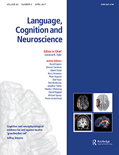
Language Cognition and Neuroscience
Fostering Interdisciplinary Dialogue in Language and NeuroscienceLanguage Cognition and Neuroscience is a premier peer-reviewed journal published by ROUTLEDGE JOURNALS, TAYLOR & FRANCIS LTD, focusing on the intersection of linguistics, cognitive psychology, and neuroscience. Since its inception in 2013, this journal has established itself as a vital resource for researchers and scholars, contributing significantly to the understanding of how language is processed and represented in the brain. With its impressive rankings in various categories—Q1 in Linguistics and Language, Q2 in Cognitive Neuroscience, and Experimental and Cognitive Psychology—it caters to a diverse and interdisciplinary audience. The journal is accessible to readers worldwide, effectively communicating cutting-edge research and innovative methodologies in the field. Open Access options enable broader disseminations of knowledge, ensuring that significant findings reach both academic and practical applications. With a commitment to high-quality research, Language Cognition and Neuroscience continues to be an influential platform for advancing theories and practices within cognitive science and language studies.
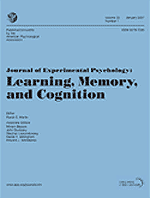
JOURNAL OF EXPERIMENTAL PSYCHOLOGY-LEARNING MEMORY AND COGNITION
Illuminating the pathways of cognitive processes.JOURNAL OF EXPERIMENTAL PSYCHOLOGY-LEARNING MEMORY AND COGNITION is a premier publication of the American Psychological Association, focused on the intricate mechanisms of learning, memory, and cognition. Established in 1975, this esteemed journal has consistently delivered impactful research, evidenced by its Q1 ranking in both Experimental and Cognitive Psychology and Linguistics and Language categories for 2023. With an impressive impact factor and ranked in the top percentiles of multiple fields, it serves as a crucial resource for researchers, professionals, and students who aspire to deepen their understanding of cognitive processes. The journal’s rigorous peer-review process ensures that only the most innovative and high-quality studies are published, providing a platform for groundbreaking findings that advance the field. Though not open access, the insights within each issue are invaluable for anyone interested in the dynamics of human cognition and memory.

Journal of Cultural Cognitive Science
Innovating Research at the Culture-Cognition NexusThe Journal of Cultural Cognitive Science, published by SpringerNature, is an esteemed forum for researchers and scholars dedicated to exploring the intersection of culture, cognition, and language. With its ISSN 2520-100X and E-ISSN 2520-1018, this journal has made significant strides since its inception in 2017, covering a wide array of topics pertinent to Experimental and Cognitive Psychology and Linguistics and Language. Notably, it has achieved remarkable recognition, ranking in the Q3 category for Experimental and Cognitive Psychology and Q1 for Linguistics and Language in 2023. Its Scopus ranks further illustrate its impact, with the journal positioned at the 89th percentile in Social Sciences - Linguistics and Language and 47th percentile in Psychology. Despite its ongoing journey, it continues to foster open dialogue and innovation among professionals, researchers, and students, providing valuable insights and advancing knowledge in the field.
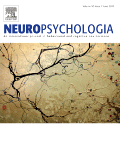
Neuropsychologia
Advancing Insights into Behavioral and Cognitive ProcessesNeuropsychologia, published by PERGAMON-ELSEVIER SCIENCE LTD, is a premier journal that delves into the intersections of psychology and neuroscience, specifically focusing on behavioral and cognitive processes. Since its inception in 1963, this esteemed journal has been a vital platform for researchers, professionals, and students, showcasing innovative studies and advancements in the fields of Behavioral Neuroscience, Cognitive Neuroscience, and Experimental Psychology. With a commendable impact factor, placing it in the Q2 category across multiple disciplines, Neuropsychologia is recognized for its contribution to the scientific community, ranking among the top journals in both Experimental and Cognitive Psychology and Neuroscience. The journal's commitment to excellence is evident in its rigorous peer-review process and its mission to disseminate cutting-edge research, making it an invaluable resource for those seeking to expand their knowledge and insights in neuropsychology. For further reading, the journal is accessible in both print and digital formats, ensuring that researchers can easily engage with the latest findings and theoretical advancements in this dynamic field.